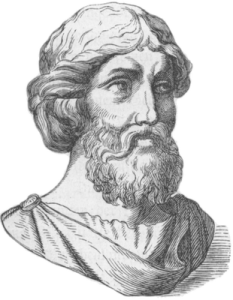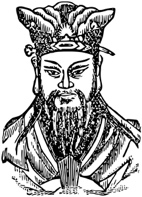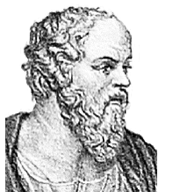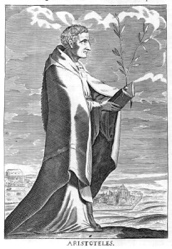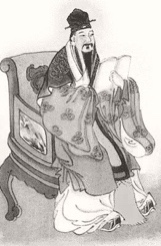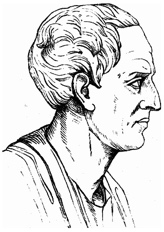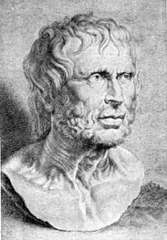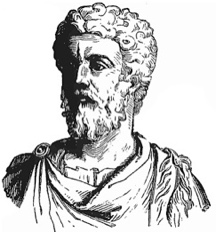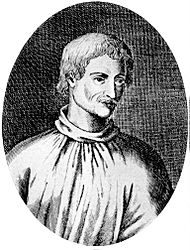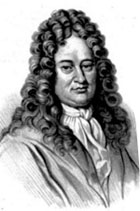Good Thinkers
This section presents knowledge mediators and humanists, which the association particularly wants to highlight for their great efforts for humanity. Several of these philosophers and great humanists were actually teachers of knowledge of life, art of living and wisdom of life. Their expositions originate from the Pythagorean school, and they are closely related to the recent presentation of the esoteric outlook on life. The reproduced quotes can serve as inspiration for one’s own reflection and meditation. For those who want to immerse themselves further in any topic, there are references to texts by Henry T. Laurency and Lars Adelskogh.
Pythagoras
(c. 700 BCE)
“He who walks the path exists not for himself, but for others.” (The Way of Man)
It is said that he advised his disciples that every time they went into their own house say the following: “Where did I trespass? What did I achieve? And unfulfilled what duties did I leave?” (Diogenes, p. 339)
“Behave one to another as not to make friends into enemies, but turn enemies into friends. To deem nothing their own. To support the law, to wage war on the lawlessness. Never to kill or injure trees that are not wild, nor even any animal that does not injure man. That it is seemly and advisable neither to give way to unbridled laughter nor to wear sullen looks.” (Diogenes p. 341)
*****
– Henry T. Laurency, The Way of Man, Section 9, p.86, (9.141.5)
– Diogenes Laertius, Lives of Eminent Philosophers II, LOEB p. 339, 341
![]()
Henry T. Laurency´s book The Knowledge of Reality 1.12-1.13 deals with The Monads and The Monad´s Envelopes.
Confucius
(551–479 BCE)
”The superior man thinks of virtue, the ordinary man thinks of comfort. The superior man thinks of sanctions of law, the ordinary man of favours.” (p.71)
”The mind of the superior man is conversant with righteousness; the mind of the ordinary man is conversant with gain.” (p.71)
“Is goodness far from us? If I want to find goodness, goodness is provided (within me).”
“The ancient wise, that wanted to cultivate his own human being, first corrected his own mind. In order to correct their mind, they first sought to be true in their thoughts. In order to be true in their thoughts, they increased their knowledge to the extreme. They increased their knowledge by exploring reality. After reality was explored, knowledge became perfect. After knowledge was perfected, thoughts became true. After the thoughts became true, the mind was corrected. After the mind was corrected, man was cultivated. From the supreme leader to the mass of the people, everyone must regard the cultivation of his own human being as the root of everything beyond that. It never happens, if the root is neglected, that what grows from there should be well cared for. It is not so that what is of great importance may be given little consideration and that at the same time what is of little importance should be given great consideration.”
*****
– The Ethics of Confucius, Miles Menander Dawson, p. 71
– Samtalen med Konfucius – interpreted by Alf Henriksson and Hwang Tsu-Yü. p. 26-27
– Från Kinas tankevärld, Translation by Bernhard Karlgren, p. 21
– Daxue 大學 (Den stora kunskapen), translated by Lars Adelskogh
Translations from the Swedish books/texts listed above, is made by the association Knowledge for human harmonious development.
![]()
P.D. Ouspensky´s book Fourth Way deals with methods for human cultivation.
Socrates
(c. 470– c. 399 BCE)
“Often when he looked at the multitude of wares exposed for sale, he would say to himself, ‘How many things I can do without!'”
“There is, he said, only one good, that is, knowledge, and only one evil, ignorance; wealth and good birth bring their possessor no dignity, but on the contrary evil.”
“For this he was most envied; and especially because he would take to task those who thought highly of themselves, proving them to be fools.”
*****
– Diogenes Laertius, Lives of Eminent Philosophers I, LOEB p. 155, 161 och 169
![]()
Henry T. Laurency´s books Philosophers Stone 1.33 and 3.46 deals with the boundaries of knowledge and public opinion, and Socrates in The Knowledge of Reality 5.7.
Plato
((c. 427- c. 347 BCE))
”Until philosophers rule as kings in their cities, or those who are nowadays called kings and leading men become genuine and adequate philosophers so that political power and philosophy become thoroughly blended together, while the numerous natures that now pursue either one exclusively are forcibly prevented from doing so, cities will have no rest from evils …” (p. 166)
“As for those, then, who look at many beautiful things but do not see the beautiful itself, and are incapable of following another who would lead them to it; or many just things but not the just itself, and similarly with all the rest—these people, we will say, have beliefs about all these things, but have no knowledge of what their beliefs are about.” (p. 174)
”There is not one city today with a constitution worthy of the philosophic nature. That is
precisely why it is perverted and altered. It is like foreign seed sown in alien ground: it tends to be overpowered and to fade away into the native species. Similarly, the philosophic species does not maintain its own power at present, but declines into a different character. But if it were to find the best constitution, as it is itself the best, it would be clear that it is really divine
and that other natures and pursuits are merely human.” (p. 191)
“Ease of learning, good memory, astuteness, and smartness, as you know, and all the other things that go along with them, such as youthful passion and high-mindedness, are rarely willing to grow together simultaneously… Yet we say that someone must have a good and fine share of both characters, or he won’t receive the truest education or honor, or be allowed to rule.” (p. 197-8)
“Tyranny probably does not evolve from any constitution other than democracy, then — the most severe and cruel slavery evolving from what I suppose is the most eminent degree of freedom.” (p. 262)
*****
– Plato’s Republic, Hackett Publ co, C.D.C. Reeve Book Five 473 C-D, 479 E, Book Six 497, 503, Book Eight, 564
![]()
Henry T. Laurency´s books The Philosophers Stone 3.10 deals with The Individual and The State, and The Knowledge of Reality 5.8 deals with Platon.
Aristotele
(c. 384– c. 322 BCE)
”Ty den verkliga skillnaden mellan människan och andra djur är att människorna ensamma har uppfattning* om gott och ont, rätt och orätt etc. Det är delandet av en gemensam syn på dessa ting, som gör ett hushåll och en stat.” *aisthesis
”But justice is the bond of men in states, for the administration of justice, which is the determination of what is just, is the principle of order in political society” ? p. 6
“For the real difference between man and other animals is that men alone have a perception * of good and evil, right and wrong, etc. It is the sharing of a common view of these things that makes a household and a state.” * aisthesis
”But then we must look for the intentions of nature in things which retain their nature, and not in things which are corrupted. And therefore we must study the man who is in the most perfect state both of body and soul, for in him we shall see the true relation of the two …” (p. 8)
”And it is clear that the rule of the soul over the body, and of the mind and the rational element over the passionate, is natural and expedient; whereas the equality of the two or the rule of the inferior is always hurtful.” (p. 9)
*****
– Politics, Aristotele, Batoche Books, B Jowett, p. 6, 8 and 9
– Aristoteles Politiken, 1253a17, translated by Lars Adelskogh/em>
Translation from the book in Swedish, “Politiken” by the association Knowledge for human harmonious development.
![]()
Lars Adelskogh´s book The Explanation 2.6 deals with The Self and Its Envelopes, and Henry T. Laurency´s book The Knowledge of Reality 5.9 deals with Aristotele.
Mencius
(c. 372– c. 289 BCE)
“Mencius said: Benevolence is [the proper quality of] man’s mind, and righteousness is man’s [proper] path. How lamentable is it to neglect this path and not pursue it, to lose this mind and not know to seek it [again]. When men’s fowls and dogs are lost, they know to seek them [again]; but they lose their mind, and do not know to seek it [again]. The object of learning is nothing else but to seek for the lost mind.” (p. 318)
“There are cases when by a certain course men might preserve life, and yet they do not employ it; and when by certain things they might avoid calamity [that will occasion death], and yet they will not do them. Therefore men have that which they like more than life, and that which they dislike more than death. They are not men of talents and virtue only who have this mental nature. All men have it ; -what belongs to such men is simply that they are able not to lose it.” (p. 317)
“Mencius replied: From the feelings proper to it, [we see] that it is constituted for the doing of what is good. This is what I mean in saying that [the nature] is good. If [men] do what is not good, the guilt cannot be imputed to their natural powers. The feeling of compassionate distress belongs to all men; so does that of shame and dislike; and that of modesty and respect; and that of approving and disapproving. The feeling of compassion and distress is the principle of benevolence; the feeling of shame and dislike is the principle of righteousness; the feeling of modesty and respect is the principle of propriety; and the feeling of approving and disapproving is the principle of knowledge. Benevolence, righteousness, propriety, and knowledge are not fused into us from without; they naturally belong to us, and [a different view] is simply from want of reflection. Hence it is said: ‘Seek, and you will find them; neglect, and you will lose them.’ [Men differ from one another in regard to them]; some as much again as others, some five times as much, and some to an incalculable amount; it is because they cannot fully carry out their [natural] endowments. (p. 311-312)
*****
– The Chinese Classics Vol II, The Life and Works of Mencius, James Legge. p. 311f, 317f
![]()
Henry T. Laurency´s book The Philosophers Stone 3.39-40 deals with Ennoblement of the Personality and The Art of Living.
Cicero
(106–43 fvt)
”What, then, is the goal of those who govern our state, that which they should have as their aiming point and focus on? Well, what is best and most desirable for all healthy, good and happy citizens: peace with dignity.”
“People’s judgments are much more based on hatred, love, lust, anger, sorrow, joy, hope, fear, delusion, or even emotion, than on truth, ordinance, rule of law, judgment, or law.”
“Not even in the greatest contexts have I found anything firmer to adhere to and conform to than seems to me most probable, since the truth itself is hidden.”
”The seeds of virtues are natural to our constitutions, and, were they suffered to come to maturity, would naturally conduct us to a happy life; but now, as soon as we are born and received into the world, we are instantly familiarized with all kinds of depravity and perversity of opinions ; so that we may be said almost to suck in error with our nurse’s milk. When we return to our parents, and are put into the hands of tutors and governors, we
are imbued with so many errors that truth gives place to falsehood, and nature herself to established opinion.” (p.92)
*****
– Latinska sentenser och citat, Gerhard Bendz och Norbert Guterman, translated from Swedish, p. 63-65
– Cicero´s Tusculun Disputations, p. 92
![]()
Henry T. Laurency´s book The Philosophers Stone 1.12-15 deals with the importance of thinking for yourself.
Seneca
(4 BCE–65)
”Virtue slackens without an opponent. How big and how strong it is only becomes clear when it, through perseverance, is allowed to show what it is capable of.”
”The wise has the same feeling for everyone, as the doctor for his sick.”
”Let us, as long as we are among men, show humanity.”
”It is not that we have a short space of time, but that we waste much of it. Life is long enough, and it has been given in sufficiently generous measure to allow the accomplishment of the very greatest things if the whole of it is well invested. But when it is squandered in luxury and carelessness, when it is devoted to no good end, forced at last by the ultimate necessity we perceive that it has passed away before we were aware that it was passing.” (p. 1)
”Finally, everybody agrees that no one pursuit can be successfully followed by a man who is preoccupied with many things—eloquence cannot, nor the liberal studies—since the mind, when distracted, takes in nothing very deeply, but rejects everything that is, as it were, crammed into it. There is nothing the busy man is less busied with than living: there is nothing that is harder to learn.” (p. 9)
*****
– Latinska sentenser och citat, Gerhard Bendz and Norbert Guterman, p. 239
– Seneca, On the shortness of Life, p. 1 and 9
Translations of “Latinska sentenser och citat” into English by the association Knowledge for human harmonious development.
![]()
Henry T. Laurency´s book Knowledge of Life One 1.16 deals with art of living, and Lars Adelskogh´s book The Explanation 9.7-8 dealt with Thought Power and Methods of Activation.
Marcus Aurelius
(121–180)
“It is given only a sunlight, even if it is broken against walls, mountains and thousands of other things, it is given only a basic being, even if it is broken in the same way in bodies of the same kind, only a soul, even if it is broken in thousands of natural beings and individuals, merely a thinking spirit even if it seems fragmented. ”
“You shall be destroyed in that which brought you forth, or rather, after the general cycle you shall be returned to the seminal reason.”
“Everything oh Cosmos, which harmonizes with you, is also good for me. Nothing, which for you matured at the right time, comes too early or too late for me. All that your seasons bring is golden fruit for me. Of you is everything, in you is everything, to you is everything…”
“How much time does he gain who has no eyes on what others are saying, doing and thinking, but merely ensures that his own actions are just, pious and good. So look not at what others have before, but walk your own path straight ahead.”
“Everything is interconnected with each other, and holy is the unifying bond. Hardly anything is foreign to another. One is adapted to the other and everything contributes to the harmony of the world. One is the universe, composed of all worlds, one is the deity who lives in everything, one is the primordial substance, one is the law, one is the reason that is common to all rational beings, and one is the truth. So it is also given a perfection to all these kindred and of the same sense involved beings.”
*****
– Filosofiens historia II, översättning av Alf Ahlberg, p. 123, 125 och 139
– Marcus Aurelius’ Självbetraktelser, Swedish translation, Ellen Wester, p. 35 och 68
Translations from the Swedish books/texts listed above by the association Knowledge for human harmonious development.
– Marcus Aurelius Meditations, Modern library translation by Gregory Hays p. 121
![]()
Henry T. Laurency´s book The Philosophers Stone 1.1 deals with The Will to Unity and Lars delskogh´s book The Explanation 1.9 deals with The Unity of Everything.
Giordano Bruno
(1548–1600)
”It is proof of a base and low mind for one to wish to think with the masses or majority, merely because the majority is the majority. Truth does not change because it is, or is not, believed by a majority of the people.”
”For there is a single general space, a single vast immensity which we may freely call Void; in it are innumerable and infinite globes like this on which we live and grow. This space we declare to be infinite, since neither reason, convenience, possibility, sense perception or nature assign to it a limit. In it are an infinity of worlds of the same kind as our own. Beyond the imaginary convex circumference of the universe is Time.”
”Since the substance of things is absolutely indissoluble, one need not fear death, but, as Pythagoras affirms, wait for it as a form of passage. Death, in fact, implies for compound things a complete dissolution, but not for the substance.”
*****
– The Great Quotations, English translation by George Seldes, p. 35
– Giordano Bruno: His Life and Thought, English translation by Singer Dorothea
– Giordano Bruno, Philosopher of the renaissance, English translation by Ramon G. Mendoza, p. 293
![]()
Henry T. Laurency´s book The Philosophers Stone 2.8 deals with Cosmos (Involvation).
Leibniz
(1646–1716)
”The Monad, of which we shall here speak, is nothing but a simple substance, which enters into compounds. By ‘simple’ is meant ‘without parts.’ And there must be simple substances, since there are compounds; for a compound is nothing but a collection or aggregatum of simple things. Now where there are no parts, there can be neither extension nor form [figure] nor divisibility. These Monads are the real atoms of nature and, in a word, the elements of things.”
”No dissolution of these elements need be feared, and there is no conceivable way in which a simple substance can be destroyed by natural means.”
”Therefore, I think it can finally be understood that the attraction to ideas is not always without danger and that many writers abuse this enticing term to give some weight to their own fantasy products. Because, from the fact that we are aware of thinking about something, it does not follow that we have an idea about that thing.”
*****
– Filosofins historia, Natur och kultur 1967, 6 uppl, Alf Ahlberg, p. 275
– Filosofiens historia IV, Alf Ahlberg, translation to Swedish, p. 146
– The Monadology, Gottfried Wilhelm Leibniz, 1714, English translation by Robert Latta, 1898, p. 1
Translations of “Filosofins historia” into English by the association Knowledge for human harmonious development.
![]()
Lars Adelskogh’s book The Explanation 1.8 deals with the Monads and Henry T. Laurency´s book The Knowledge of Reality 1.4 deals with the Basic Factors of Existence.
Schopenhauer
(1788–1860)
”Given the innate character of the human being, in general, the aims to which he invariably strives are already essentially determined: the means that he uses for this purpose are determined partly by external circumstances and partly by his apprehension of these, the
accuracy of which depends on his understanding and its education.” (p.57)
“Therefore, everything which does not point to a certain, scientific verification must yield when it stands in the way of well-grounded truth, but not the other way around, and by no means should it agree to accommodations and limitation to accord with unproven, and perhaps erroneous, assertions.” (p. 93)
Intellect, or the cognitive faculty, is the medium of motives, that is, the medium by which motives work on the will, which is the true core of the human being. (p. 99)
*****
– Arthur Schopenhauers The Two Fundamental Problems of Ethics, David E. Cartwright & Edward E. Erdmann. Oxford World´s classics p. 57, 93 and 99
![]()
Henry T. Laurency´s book The Philosophers Stone 1.31 and 3.5 deals with Sense and Reason, and Freedom of Choice.


